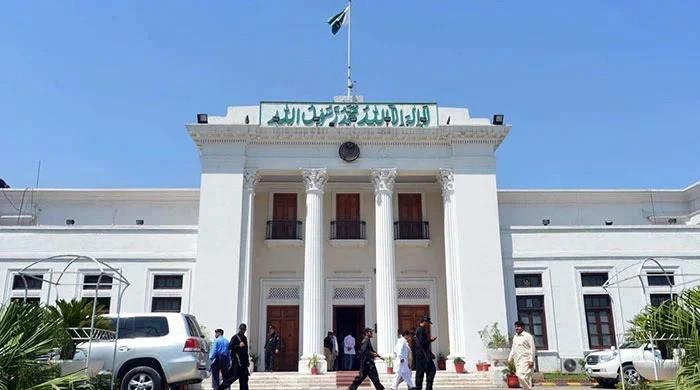Harmonising sales tax across Pakistan
After 18th Amendment, a business operating all over Pakistan in goods and services has to account for registration and sales tax returns
June 06, 2022

The 18th Amendment to the Constitution had a profound impact on the legal and political framework of the country. Among other measures leading to the long-awaited provincial autonomy, the amendment led to drastic changes in the sales tax system of the country.
As part of the overarching endeavour to achieve fiscal autonomy for the provinces, the sales tax on services was specifically excluded from the federal legislative domain, making it a provincial subject. This devolution of power caused major legislative and structural changes in the sales tax system, with provincial governments enacting their own laws and establishing provincial authorities for the administration of sales tax on services. Without denying the instrumental role of the provincialization of sales tax on services in strengthening the provincial economies, the ramifications of the fragmented sales tax system in the form of increasing conflicts between the provinces among themselves and with the centre, yielding problems for business entities, cannot be ignored.
The disparities in the design, structure, and operation of different sales tax regimes have made compliance for businesses exceedingly complex. First, the splitting of sales tax into sales tax on goods and services has resulted in a multiplicity of sales tax jurisdictions. Under the current system, a business operating all over Pakistan in goods and services has to account for registration, sales tax returns, and other compliance before five different tax authorities. In addition to making compliance difficult, this has also caused a spike in compliance costs. Already burdened with extensive compliance under other tax laws, the barrage of compliance under provincial sales tax enactments has added insult to injury for businesses.
Second, the lack of understanding between the centre and the provinces over a uniform definition of goods and services has resulted in jurisdictional conflicts. Consequently, the taxation of businesses involving the supply of goods as well as the provision of services—industrial vending, food supply and restaurants, construction businesses, fashion design, etc.—often results in a tax war situation between the federal and provincial authorities. Likewise, the differences among the provinces over the classification of services and the applicability of origin-destination principles give rise to the demand for tax on a single service by multiple jurisdictions. The use of different Pakistan Customs Tariff (PCT) codes by the provinces for the same services also gives rise to tax disputes.
Third, inter-jurisdictional variations in tax rates, exemptions, assessment processes, and systemic procedures, have damaged the uniformity and consistency of the sales tax system in the country. The regulatory regime and domestic institutional structures of a country being the major factors considered by foreign investors, the current sales tax system has gravely impaired the prospects of foreign investment in the country. Rated 108 on the Ease of Doing Business Index (EDBI) as per the Doing Business 2019 report (most recent) issued by the World Bank, Pakistan has made zero progress towards improving the ease of doing business environment for more than a decade. Rather, the Pakistan Paying Taxes rating has gone from 18 in 2011 to 30 in 2019, indicating an increase in the compliance difficulties of taxpayers.
Policymakers and the business community concede to the idea that harmonisation of different sales tax regimes can be an effective tool to deal with the issues in the current sales tax system. Along with reducing compliance costs for businesses, harmonisation can also benefit state institutions by cutting down on their administrative costs and dealing with tax collection inefficiencies. Harmonization will also make the sales tax system more efficient, uniform, and consistent, which will improve Pakistan's score on the EDBI.
Notably, the efforts towards the harmonisation of sales tax in Pakistan commenced in December 2019 on the recommendations of the International Monetary Fund (IMF) and the World Bank. In March 2020, the federal and provincial tax authorities mutually established the National Tax Council (NTC) as a national body tasked with resolving the issues in the current sales tax system. The responsibilities of the NTC include harmonising the sales tax rates applicable to goods and services for the entire country, formulating model sales tax laws on goods and services along with precise definitions of goods and services, principles governing the place of supply, rules for exemptions, apportionment of sales tax on services for inter-provincial trade, data harmonization; and other related matters.
After being halted by the pandemic for a long period, the harmonisation efforts resumed with the first-ever meeting of the NTC on September 2, 2021. At the second meeting of the NTC held on September 16, 2021, the federation and the provinces developed a consensus on a single portal system for the filing of sales tax returns along with other issues, including taxation rights on the construction business, toll manufacturing, restaurants, and transportation. In January 2022, the Federal Board of Revenue (FBR) launched the National Sales Tax Return (NSTR), calling it a "significant milestone towards automation and data integration in order to facilitate the taxpayers, promote ease of doing business, and reduce compliance costs", and also signed an MOU with the Central Board of Revenue, Azad Jammu & Kashmir (AJ&K) for the extension of the NSTR to its territorial jurisdiction.
Despite the development with the consensus of and agreements signed by the provinces, the implementation of the NSTR has not yet been possible, and taxpayers are still required to file sales tax returns with the respective provincial authorities. Importantly, the major obstacle in the way of the implementation of the NSTR is the lack of legal backing that is possible only through amendments in the provincial sales tax laws. Therefore, until the legislative reforms are brought, the centre and the provinces may proceed to undertake measures that are purely administrative in nature.
For example, the NSTR may currently be made operational only for the purposes of filing returns on a single portal without disturbing the tax collection rights of the provinces. Similarly, the transition to a single portal may be done in steps: introducing sectoral returns for specific sectors as a first step to help identify and overcome the practical glitches. Taking professionals and the business community into the loop while devising the harmonisation framework is also crucial for the smooth implementation of the intended reforms.
The NTC and other stakeholders need to make collective efforts towards the harmonisation of sales tax to alleviate the hurdles faced by businesses amidst the prevailing economic crisis in the country. The centre and the provinces must act together to reap the economic and administrative benefits of harmonisation at a time when the country needs them the most. Lastly, as the NTC consists of members from the federal and provincial governments, the current political setup makes it an ideal time for reaching a consensus on and implementing country-wide sales tax reforms.
The writer is a fellow member of the Institute of Chartered Accountants of Pakistan and a law graduate, currently working as office managing partner, EY Ford Rhodes Lahore.
Originally published in The News











